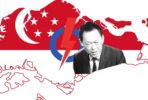INDONESIAN Foreign Minister Marty Natalegawa has told the Singapore media that “no ill intent was meant, no malice, no unfriendly outlook”, when Indonesia named a new frigate KRI Usman Harun, after two Indonesian marines executed in 1968 for a 1965 terror attack on MacDonald House in Orchard Road that killed three and injured 33.
Singaporeans will no doubt be happy to know this. But I am afraid that the Foreign Minister entirely missed the point.
The issue is not Indonesia’s intentions. It is something far more fundamental. Indonesians never tire of reminding Singapore that we should be “sensitive” and “neighbourly”. But Indonesians do not seem to believe that they should be equally “sensitive” to their neighbours. “Sensitivity” and “neighbourliness” are to them a one-way street.
These are the facts: Between 1963 and 1966, then Indonesian President Sukarno waged a “Konfrontasi” (confrontation) of terror attacks and military action to “Ganjang (crush) Malaysia”. Singapore was part of the Federation of Malaysia formed in September 1963 until August 1965 when it became independent.
In Singapore alone, there were some 40 bomb attacks over about two years. Most of the targets could by no stretch of the imagination be considered legitimate military objectives. They included schools, hotels, cinemas, bus depots, telephone booths and residences.
MacDonald House was an office building. The victims of that bombing were civilian office workers. Relatives of the victims are still alive. Older Singaporeans still remember the fear and uncertainty of that period. Are we not entitled to some “sensitivity”?
The two who planted the bomb, Osman Mohamed Ali and Harun Said, may have been Indonesian marines, but were in civilian clothes and sneaked into Singapore for terror attacks against civilians. They were found guilty of murder and executed after they had exhausted all legal appeals.
What would Indonesians think if the Singapore Navy were to go crazy and name one of its warships after Noordin Top, the terrorist behind bombings in Jakarta in 2004 and 2009 and who may have assisted in the 2002 Bali bombings?
The late President Suharto sent a personal emissary to plead for clemency for the two marines. But they had been convicted of murder after due legal process. On what grounds could Singapore have pardoned them?
To have done so would have been to concede that the small must always defer to the big and irretrievably compromise our sovereignty.
After Singapore refused the clemency appeals, a Jakarta mob then sacked our embassy, burned our flag and threatened to kill our ambassador.
There were actually four Indonesians on death row in Singapore in 1968 for crimes committed during Konfrontasi. Two others, Stanislaus Krofan and Andres Andea, had their sentences remitted after pleas by the Indonesian government and were sent back to Indonesia. The bomb they planted did not kill anyone.
A few years later in 1973, Singapore’s then Prime Minister Lee Kuan Yew placed flowers on the graves of the two executed marines, thus bringing the episode to a close.
Both actions – standing firm on fundamental principle even at the risk of conflict and making a gracious gesture once the principle had been established – were equally important in setting the foundations of the relationship Singapore today enjoys with Indonesia.
The origins of Konfrontasi are complex: the political tensions and contradictions within Indonesian society of that time, Sukarno’s fiery personality and grandiose ambitions for “Indonesia Raya” (greater Indonesia), among other things.
Self-righteous nationalism
THESE conditions are not likely to be repeated. But as the respected American scholar of Indonesia, the late Dr George McTurnan Kahin, wrote in 1964 while Konfrontasi was still ongoing, that episode of aggression towards its neighbours was the consequence of the “powerful, self-righteous thrust of Indonesian nationalism” and the widespread belief that “because of (the) country’s size… it has a moral right to leadership”.
Time may have given a more sophisticated gloss to this attitude but has not essentially changed it.
This attitude lies, for example, behind the outrageous comments by some Indonesian ministers during the haze last year that Singapore should be grateful for the oxygen Indonesia provides; it is the reason why Indonesians think Singaporeans should take into account their interests and sensitivities without thinking it necessary to reciprocate.
Indonesians and Singaporeans need to understand this.
Of course, Indonesia has the right to name its ship anything it pleases, as some Indonesians have argued. But that is beside the point.
Why choose a name that is bound to cause offence? That the Indonesians did not even think of the implications, as Foreign Minister Marty’s comments to the media would suggest, is exactly the point.
I do not expect the Indonesians to change the name of the ship. But would any Indonesian leader be prepared to emulate Mr Lee Kuan Yew and place a wreath at MacDonald House?
It was not Singapore that started this incident. And Singapore has no interest in seeing relations with a close neighbour strained.
But Singaporeans cannot let this episode pass without signalling our displeasure.
The foundations laid for the bilateral relationship in 1968 and 1973 are still valid. Mutual respect is the essential condition for good relations.
My father was ambassador to Indonesia when Singapore’s embassy was sacked. He was on leave in Singapore when the decision was taken to turn down the appeal for clemency. He went back to Jakarta to be at post when the execution took place.
After the mob attacked our embassy, he and all our staff remained at post, operating from Hotel Indonesia.
I was a schoolboy studying in Singapore at that time. But shortly after the attack, he summoned me to Jakarta to join him and my mother. I now realise that it was to show that we were not intimidated. It was my first lesson in diplomacy.
I spent a boring month holed up in Hotel Indonesia.
The only “entertainment” was the daily demonstrations in the square in front of the hotel, which included a seemingly endless stream of red-bereted KKO (Navy Commando Corps) commandos marching by, shouting threatening slogans.
But after a while, I realised that it was only a few units marching round and round in circles because I came to recognise the faces of individual soldiers. And that too is a lesson that Singaporeans should understand.








